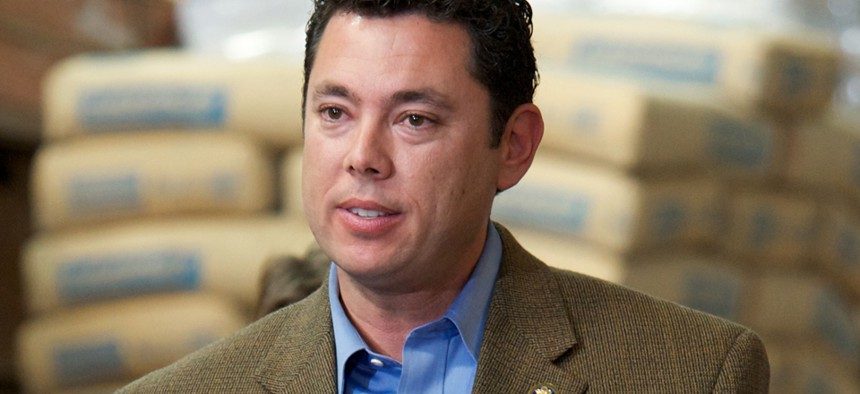
House GOP
Chaffetz Will Replace Issa as House Oversight and Government Reform Chairman
Media-savvy Republican has shepherded legislation affecting federal employees’ pay and benefits.
Rep. Jason Chaffetz is the new chairman of the House Oversight and Government Reform panel, besting several more senior Republicans for the top slot.
The media-savvy Utah Republican replaces Darrell Issa, R-Calif., who for the last six years has presided over one of the chamber’s most partisan committees. The contest to replace Issa was the most competitive of the committee leadership races for the 114th Congress, with observers wondering whether Issa’s successor would continue his strong-armed, and often polarizing, oversight of the Obama administration, or focus on more bipartisan issues like reforming government.
“The faith placed in me by my colleagues today is a tremendous honor and privilege. I am fully committed to taking on difficult tasks that a chairmanship requires,” said Chaffetz in a statement. “I have great respect for Chairman Darrell Issa and can’t thank him enough for his many years of dedicated service leading the Oversight Committee. I thank him for the professional opportunities he has allowed me on the committee, and for his personal friendship. His commitment to the public good is without question.”
Issa called Chaffetz “a valued colleague and demonstrated leader who will continue the work of the Oversight Committee in the next Congress.”
Chaffetz, who beat out Ohioans Michael Turner and Jim Jordan for the chairmanship, has pledged to focus on both oversight and government reform. He has a reputation for being aggressive, but often takes a more conciliatory tone than Issa and has worked across the aisle on issues affecting federal workers, including bipartisan legislation allowing feds to deposit lump sums from their unused annual leave into their Thrift Savings Plan accounts to boost their savings. Chaffetz also has sponsored bills that would allow the federal government to fire employees who cheat on their taxes.
Jordan, whom The Wall Street Journal’s editorial page endorsed to replace Issa, offered his congratulations to Chaffetz. “I look forward to working with him and the rest of our colleagues on both sides of the aisle to do the important work of the committee.”
As head of Oversight and Government Reform, Chaffetz will focus on reforms within the Secret Service and embassy security, for example. He has frequently put himself front and center on hot topics, and has touted his communication skills and media accessibility. The Utah Republican appeared on major news networks commenting on security breaches at the White House shortly after the stories broke, and along with Issa, has led the investigation into the 2012 attacks that killed four Americans at the U.S. embassy in Libya.
Chaffetz has been actively positioning himself for the job this past year. In March, the third-term congressman told Politico in an interview: “I put my flag in the ground early; I’m not trying to be coy. I’m being direct that I fully intend to put my name in to be the next chairman of the Oversight Committee. It’s something I’ve wanted to do before I even got to Congress. The Oversight Committee has been my No. 1 choice every single term.”
Issa, who also sits on the Judiciary Committee, decided not to seek a waiver from GOP leadership to continue as chairman of the Oversight and Government Reform Committee. The California Republican, who has made liberal use of the panel’s subpoena power during his tenure, has had a fractious relationship with the committee’s Ranking Member Elijah Cummings, D-Md. While they have worked together on some issues -- Postal Service reform and more recently, the investigation into security breaches at the White House -- they clash more often than not. Their feud culminated in Issa cutting off Cummings’ microphone when he was speaking during a contentious Internal Revenue Service hearing in March.
Chaffetz and Cummings have a cordial relationship, and this past summer visited one another’s congressional districts in an effort to demonstrate bipartisanship.







